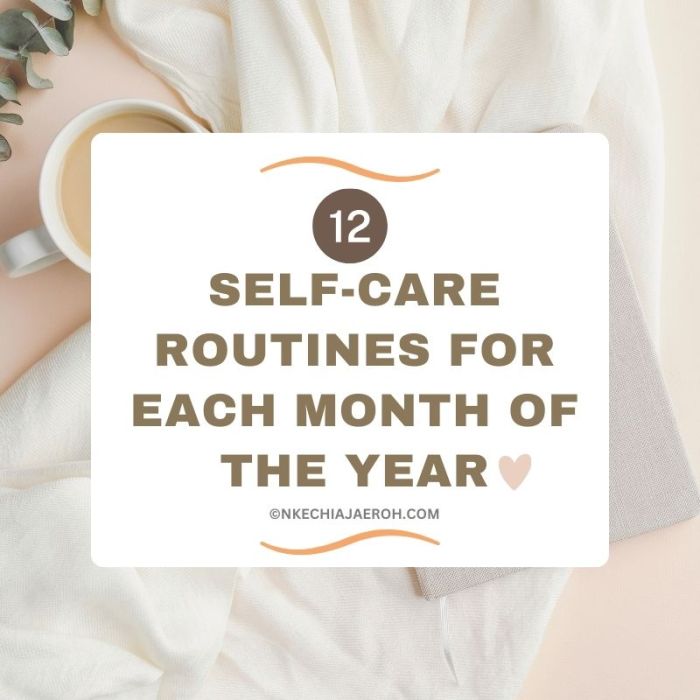Self-Care Routines That Actually Lower Health Risks: A Comprehensive Guide
Embark on a journey to explore Self-Care Routines That Actually Lower Health Risks, delving into the crucial practices that can positively impact your overall well-being. Discover the science-backed methods that can help prevent diseases and improve your health in various aspects.
Importance of Self-Care Routines
Self-care routines play a crucial role in lowering health risks by promoting overall well-being and preventing various diseases. Consistent self-care practices can have a significant impact on one's physical, mental, and emotional health.
Positive Impact of Consistent Self-Care
Engaging in regular self-care activities can lead to the following benefits:
- Reduced levels of stress and anxiety, which are known contributors to numerous health issues.
- Improved immune function, making the body more resilient to illnesses.
- Better sleep quality, crucial for overall health and well-being.
- Enhanced mental clarity and focus, resulting in improved productivity and cognitive function.
Connection Between Self-Care and Disease Prevention
Self-care practices can directly impact disease prevention by:
- Lowering the risk of chronic conditions such as heart disease, diabetes, and obesity through healthy lifestyle habits.
- Boosting the body's immune system, reducing susceptibility to infections and illnesses.
- Managing and reducing inflammation, a common factor in many diseases.
Key Self-Care Practices for Lowering Health Risks
Scientifically proven self-care practices that can help lower health risks include:
- Regular physical exercise to maintain cardiovascular health and weight management.
- Healthy eating habits that provide essential nutrients and support overall well-being.
- Stress management techniques such as meditation, deep breathing, and mindfulness to reduce the impact of stress on the body.
- Adequate sleep to allow for proper rest and rejuvenation of the body's systems.
Physical Self-Care Practices
Regular physical self-care practices play a crucial role in lowering the risk of various health conditions and promoting overall well-being. Incorporating physical activities and proper nutrition into your routine can significantly impact your health in a positive way.
Benefits of Regular Exercise
Regular exercise is essential for maintaining good health and reducing the risk of numerous diseases. Some benefits of regular exercise include:
- Improved cardiovascular health
- Weight management
- Enhanced mood and mental well-being
- Strengthened muscles and bones
Role of Proper Nutrition
Proper nutrition is key to preventing diseases and maintaining good health. A balanced diet rich in nutrients can provide the following benefits:
- Boosted immune system
- Improved energy levels
- Reduced risk of chronic diseases
- Healthy weight maintenance
Physical Self-Care Activities
Engaging in physical self-care activities can promote overall well-being and improve your quality of life. Some examples of physical self-care activities include:
- Yoga or Pilates for flexibility and relaxation
- Strength training for muscle tone and bone health
- Cardiovascular exercises like running or cycling for heart health
- Daily walks or hikes in nature for mental rejuvenation
Mental and Emotional Self-Care Strategies
Taking care of our mental and emotional well-being is crucial for overall health and disease prevention. Stress management techniques play a significant role in lowering the risk of certain health issues. When we are able to effectively manage stress, we reduce the impact of chronic stress on our bodies, which can lead to various health problems such as heart disease, obesity, and weakened immune system.
Mindfulness Practices for Better Health Outcomes
- Practice deep breathing exercises to calm the mind and reduce stress levels.
- Engage in meditation to improve focus, clarity, and emotional stability.
- Take regular breaks throughout the day to reset and refocus your mind.
Improving Emotional Well-Being through Self-Care Activities
- Engage in activities that bring you joy and relaxation, such as hobbies or spending time with loved ones.
- Journaling can help you process emotions and gain clarity on your thoughts and feelings.
- Practice self-compassion and treat yourself with kindness and understanding during challenging times.
Social and Spiritual Self-Care Practices
Social connections and spiritual well-being play crucial roles in overall health and wellness. Incorporating social and spiritual self-care practices can significantly lower health risks and promote holistic well-being.
Social Self-Care: Building Relationships
Cultivating meaningful relationships with family, friends, and community members is essential for emotional support and stress reduction. Ways to incorporate social self-care include:
- Regularly scheduling time to connect with loved ones.
- Joining clubs, groups, or classes to meet new people with similar interests.
- Engaging in acts of kindness and volunteering to give back to the community.
Spiritual Self-Care: Mindfulness and Reflection
Spirituality and mindfulness practices can help reduce anxiety, improve mental clarity, and enhance overall well-being. Tips for integrating spiritual self-care into daily routines include:
- Practicing meditation or deep breathing exercises to promote inner peace.
- Engaging in activities that align with personal values and beliefs, such as journaling or spending time in nature.
- Attending religious or spiritual gatherings to foster a sense of connection and purpose.
Last Recap

In conclusion, prioritizing self-care routines not only enhances your physical and mental health but also plays a significant role in lowering health risks. By incorporating these practices into your daily life, you can pave the way towards a healthier and happier future.
Frequently Asked Questions
How often should I engage in physical self-care practices?
Consistency is key when it comes to physical self-care. Aim for at least 30 minutes of exercise most days of the week for optimal health benefits.
Can social self-care really impact my health?
Absolutely. Maintaining strong social connections can reduce stress levels, boost immunity, and improve overall well-being, leading to lower health risks.
What are some simple mindfulness practices I can incorporate into my daily routine?
Practicing deep breathing, meditation, or mindful walking are great ways to introduce mindfulness into your daily life and reap its health benefits.
How can I integrate spiritual self-care into my busy schedule?
Carve out some time each day for activities like prayer, meditation, or reflection to nurture your spiritual well-being and promote holistic health.



